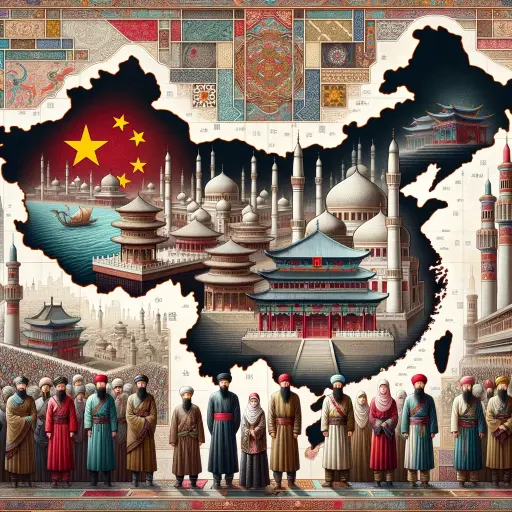The Chinese government’s “mosque consolidation” policy, according to Human Rights Watch (HRW), is significantly reducing the number of mosques in Ningxia and Gansu provinces, violating religious freedom rights. This policy involves decommissioning, closing, demolishing, and converting mosques for secular use, as well as removing Islamic architectural elements like domes and minarets from many mosques. HRW asserts that this is not mere consolidation, but a closure and destruction of mosques, representing a systematic effort to curb the practice of Islam in China.
This initiative aligns with Chinese law, which permits religious practice only in officially approved worship places of officially approved religions. Since President Xi Jinping’s call for the “Sinicization” of religions in 2016, aiming to align religions with the Chinese Communist Party (CCP) ideals, state control over religion has intensified.
The “mosque consolidation” strategy is part of a broader 2018 CCP directive to “Sinicize” Islam, aimed at standardizing the management of Islamic religious venues. This involves a policy to not build new Islamic venues and to demolish more mosques than are constructed.
Ma Ju, a U.S.-based Hui Muslim activist, mentions that this policy is also aimed at transforming devout Muslims to prioritize loyalty to the CCP. Hui Muslims who are CCP members are initially approached, followed by students and government workers, who face threats of probation and unemployment for maintaining their faith.
Government documents indicate that this mosque consolidation is occurring primarily in Ningxia and Gansu provinces, home to the largest Muslim populations in China after Xinjiang. Since 2017, in Xinjiang, about two-thirds of the region’s mosques have been damaged or destroyed, with half being demolished outright, according to the Australian Strategic Policy Institute (ASPI).
The United States Institute of Peace reports that China has been conducting a systematic campaign of human rights abuses against the Uyghur population and other minority groups in the Xinjiang Uyghur Autonomous Region (XUAR) for nearly a decade. Over one million Uyghurs have been detained in “re-education centers” where they face forced labor, torture, rape, and sterilization. These actions have led the United States and several other countries to label them as genocide and crimes against humanity.
In response, Washington and the international community have taken various measures to highlight these atrocities and hold China accountable. Uyghur civil society groups have also been active, seeking justice through both international and domestic legal channels. Despite these efforts, Beijing has not indicated any intention of changing its policies towards the Uyghurs.
In August of the previous year, the United Nation’s Office of the High Commissioner for Human Rights (OHCHR) released a report just before the end of High Commissioner Michelle Bachelet’s term. This report found substantial evidence of China’s crimes against humanity in XUAR. China criticized the report, dismissing it as a U.S. conspiracy and arguing that it exceeded the OHCHR’s mandate.
The timing and manner of the report’s release drew criticism for being too subdued, possibly to avoid offending Beijing, which detracted from its findings. Bachelet’s successor, Volker Turk, has continued a cautious diplomatic approach, avoiding direct criticism of Beijing, which has raised concerns among human rights advocates.
The mosque issue is only a small part of the larger problem in China, which suppresses religion and oppresses the Uyghurs, a Muslim minority living in China.
To advance accountability for the Uyghurs, the international community should take several steps. On the international level, engaging in treaty-body reporting processes like the Universal Periodic Review in early 2024 will raise awareness of Beijing’s human rights violations against the Uyghurs. Continuing to spotlight the Uyghur crisis in U.N. bodies, as US Ambassador Linda Thomas-Greenfield notably did, remains crucial. Strengthening the coalition of like-minded actors within the U.N. General Assembly, especially among states in Africa, East and South Asia, and the Middle East where Beijing wields significant influence, is also essential.
At the state level, supporting Uyghur civil society in their advocacy and public sharing of Uyghur victims’ and survivors’ experiences will counter Beijing’s tactics of transnational repression. Aiding diaspora-led efforts to seek justice for Uyghurs through universal jurisdiction claims will strengthen the judicial record against Beijing. Providing forums for Uyghurs to share their experiences, such as the recent House Select Committee hearing on the Chinese Communist Party, is another vital step. Implementing prohibitions on forced labor, like the UFLPA and the EU’s proposed ban on goods produced with forced labor, will economically impact Beijing for its mistreatment of the Uyghurs.
Beyond these traditional accountability efforts, promoting and preserving Uyghur culture also plays a significant role. This includes creating platforms to showcase Uyghur art, music, fashion, food, and history, thereby countering China’s attempts at cultural erasure. As China continues to delay acknowledging its crimes and engaging in accountability processes, these actions by the international community are crucial in maintaining the focus on the Uyghur issue and supporting the pursuit of justice for this oppressed population.
And China can start by allowing freedom of religion and leaving the mosques alone.
